I encoded the wav file in base64 (audioClipName.txt in Resources/Sounds).
Then I tried to decode it, make an AudioClip from it and play it like this:
public static void CreateAudioClip()
{
string s = Resources.Load<TextAsset> ("Sounds/audioClipName").text;
byte[] bytes = System.Convert.FromBase64String (s);
float[] f = ConvertByteToFloat(bytes);
AudioClip audioClip = AudioClip.Create("testSound", f.Length, 2, 44100, false, false);
audioClip.SetData(f, 0);
AudioSource as = GameObject.FindObjectOfType<AudioSource> ();
as.PlayOneShot (audioClip);
}
private static float[] ConvertByteToFloat(byte[] array)
{
float[] floatArr = new float[array.Length / 4];
for (int i = 0; i < floatArr.Length; i++)
{
if (BitConverter.IsLittleEndian)
Array.Reverse(array, i * 4, 4);
floatArr[i] = BitConverter.ToSingle(array, i * 4);
}
return floatArr;
}
Every thing works fine, except the sound is just one noise.
I found this here on stack overflow, but the answer dosnt solve the problem.
Here are details about the wav file from Unity3D:
Does anyone know what the problem is here?
EDIT
I wrote down binary files, one just after decoding from base64, second after final converting, and compared it to the original binary wav file:
As you can see, file was encoded correctly cause just decoding it and writing the file down like this:
string scat = Resources.Load<TextAsset> ("Sounds/test").text;
byte[] bcat = System.Convert.FromBase64String (scat);
System.IO.File.WriteAllBytes ("Assets/just_decoded.wav", bcat);
gave same files. All files have some length.
But the final one is wrong, so the problem is somewhere in converting to float array. But I dont understand what could be wrong.
EDIT:
Here is the code for writing down the final.wav:
string scat = Resources.Load<TextAsset> ("Sounds/test").text;
byte[] bcat = System.Convert.FromBase64String (scat);
float[] f = ConvertByteToFloat(bcat);
byte[] byteArray = new byte[f.Length * 4];
Buffer.BlockCopy(f, 0, byteArray, 0, byteArray.Length);
System.IO.File.WriteAllBytes ("Assets/final.wav", byteArray);

